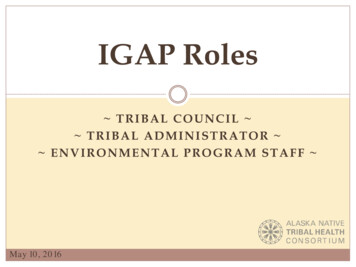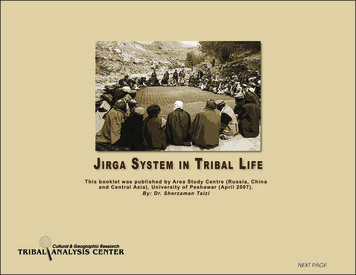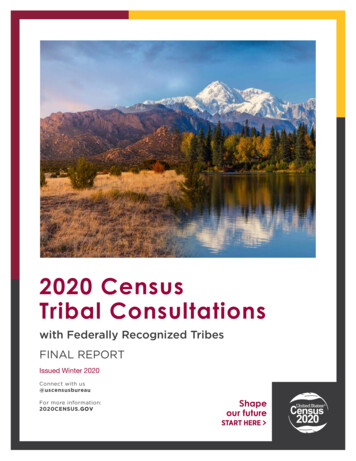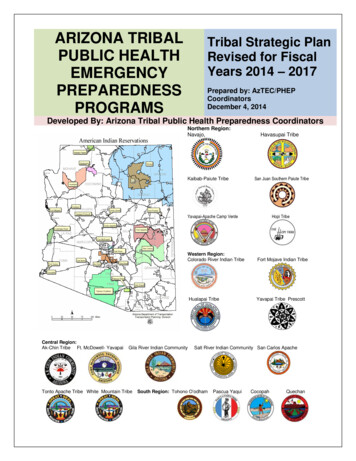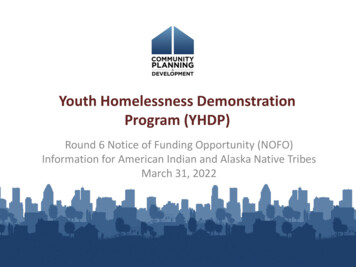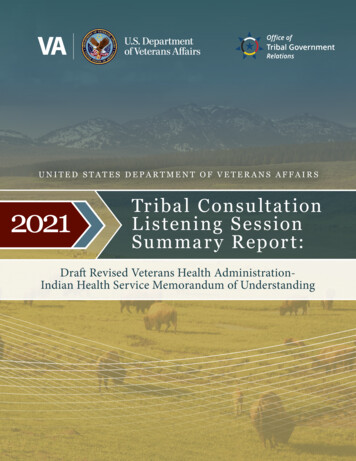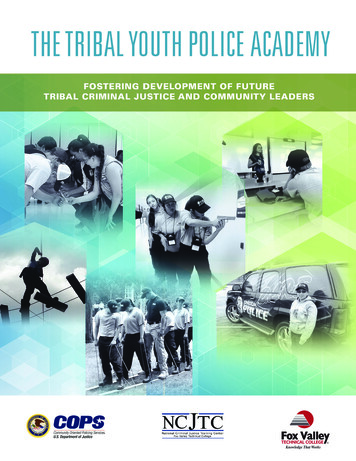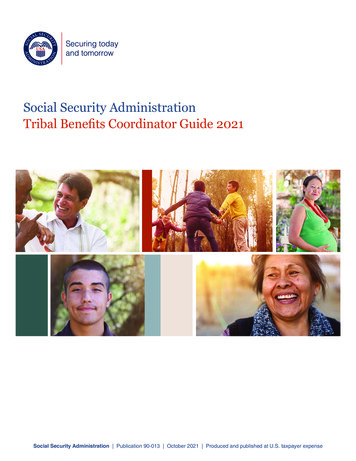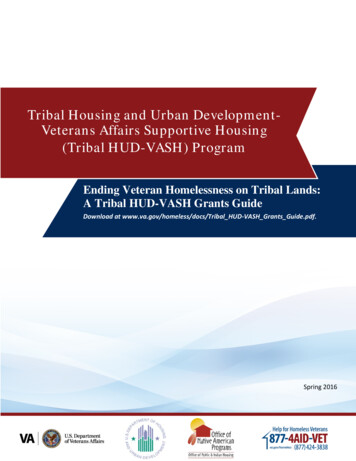
Transcription
Tribal Housing and Urban DevelopmentVeterans Affairs Supportive Housing(Tribal HUD-VASH) ProgramEnding Veteran Homelessness on Tribal Lands:A Tribal HUD-VASH Grants GuideDownload at www.va.gov/homeless/docs/Tribal HUD-VASH Grants Guide.pdf.Spring 2016
Ending Veteran Homelessness on Tribal Lands: A Tribal HUD-VASH Grants GuideIntroduction – One Veteran’s StoryANative American Veteran had lived on Indian reservation land for 25 years, in a campprotected by his dog. He fed himself and his pup each night with food from a restaurantdumpster. He occasionally met with Department of Veterans Affairs (VA) outreach staff,but opted to decline their overtures of assistance to secure stable housing through theDepartment of Housing and Urban Development (HUD)-VA Supportive Housing (VASH) program.Eventually, forced to move from the reservation to a less secure encampment near the ColoradoRiver, the Veteran became more receptive to offers of housing assistance from VA staff. Yetwith only a DD-214 and Social Security card, and no picture identification, apartment huntingwas difficult—every landlord wanted a picture ID.VA HUD-VASH workers did not give up, and continued to work to secure the Veteran housing. Intime, VA staff found a housing authority apartment complex willing to accept the Veteran’salternative non-photograph forms of identification. Finally, the Veteran and his caninecompanion had access to a permanent home.Ending homelessness among all Veterans—including Native American Veterans—is a nationalpriority. Tribal HUD-VASH is a demonstration pilot program run by VA and HUD brings thatmission to tribal lands. Under the first-ever Tribal HUD-VASH, 26 tribes are sharing 5.9 millionin funding for rental assistance. Case management and supportive services for homelessAmerican Indian or Alaska Native Veterans or those at risk of homelessness, and living on or offtribal lands (within the authorized tribal/tribally designated housing entities [TDHEs] serviceareas) is also provided.Although it has key differences, Tribal HUD-VASH is modeled on the standard HUD-VASHprogram, which combines HUD rental assistance for homeless Veterans with VA casemanagement and clinical services. Since 2008, HUD-VASH has admitted over 157,800 homelessVeterans to case management. In its first year, Tribal HUD-VASH will permanently house andprovide supportive services to an estimated 500 American Indian or Alaska Native Veteranswho are homeless or at risk of homelessness.This guide is designed to familiarize VA medical centers, tribes, TDHEs and community providerswith this new program and help them work together to permanently house American Indianand Alaska Native Veterans.Use this guide as a resource to begin developing a Tribal HUD-VASH program in yourcommunity.About This PublicationDeveloped in partnership between the VA and HUD, this guide aims to assist in theimplementation of Tribal HUD-VASH. As new information becomes available, the guide willbe updated and new copies issued so that everyone involved in making this program asuccess will have the latest, most comprehensive information in one place.Page1
Ending Veteran Homelessness on Tribal Lands: A Tribal HUD-VASH Grants GuideTable of ContentsTribal HUD-VASH Fact Sheet . 3Getting Started Checklist . 5Frequently Asked Questions . 7Glossary of Terms . 11Resources . 13Appendix I: HUD Tribal Grants News Release and Grantees . 14Appendix II: Tribal HUD-VASH Grant Addendum. 17Appendix III: Federal Definitions of Homeless, At-Risk of Homelessness and ChronicHomelessness . 20Appendix IV: Tribal HUD-VASH Tribal–Federal Contact List . 25Page2
Ending Veteran Homelessness on Tribal Lands: A Tribal HUD-VASH Grants GuideTribal HUD-VASH Fact SheetTribal Housing and Urban Development (HUD)-VA Supportive Housing (VASH) is ademonstration pilot program combining 5.9 million in rental assistance from HUD with casemanagement, clinical and supportive services provided by VA. A total of 26 Indian tribes andtribally designated housing entities (TDHEs) received grants ranging from 123,288 to 391,740to fund rental assistance and associated administrative fees. Tribal HUD-VASH provides 500vouchers to serve Native American Veterans who are homeless or at risk of homelessness.How It Works Determine Eligibility – VA staff first screen Veterans for basic eligibility for the program,based on certain criteria, including determination of homelessness or “at risk” ofhomelessness status, eligibility for VA health care benefits, need for case managementservices and other factors. VA refers eligible Veterans to the tribe/TDHE, which thenundertakes additional screening to further determine eligibility status (i.e., that the Veteranis in fact “Indian” under the law, is income-eligible and is not subject to a lifetimeregistration requirement under a state sex offender registration program). Eligible Veteransmust agree to case management to receive Tribal HUD-VASH assistance. Veterans areselected based on highest need, with chronically homeless Veterans and highestvulnerability/need Veterans prioritized.Provide Housing – Tribes/TDHEs then deliver tenant- or project-based assistance to VAreferred and tribally screened members.Deliver Case Management – Tribes/TDHEs also partner with the VA case manager (who iseither hired by VA or contracted with the tribe) to make sure housing assistance recipientsreceive the case management and supportive services needed to sustain housing. Servicesmay include substance use treatment, mental health care, health care, job training andeducation about tenancy rights and responsibilities.Ensure that Housing First is Used – All HUD-VASH programs operate using the principles ofHousing First. Housing First provides immediate access to housing without prerequisites,such as sobriety or clean time; targets those who have remained homeless for years andwho have complex clinical needs; has two main components—permanent housing in theform of independent apartments and off-site treatment teams; and uses a treatmentphilosophy that is consumer-directed or Veteran-centered. Housing First does not requireVeterans to participate in treatment or attain sobriety as a precondition for housing, and itadjusts the level of case management and supportive services to meet the Veteran’s wantsand needs.Get Started Coordinate – VA and tribal grantees should work together to discuss eligibility, casemanagement, outreach strategies and next steps. All partners must work to developprocesses that gain and sustain housing for eligible Veterans. Every partner should havepoints of contact for all involved agencies.— continued on page 4Page3
Ending Veteran Homelessness on Tribal Lands: A Tribal HUD-VASH Grants Guidecontinued from page 3 — Educate – VA and tribal grantees should work with community agencies—tribal Veterans’services/offices, tribal law enforcement, health agencies, drug and alcohol serviceproviders, and others—to let them know about this potential resource for Native AmericanVeterans who are homeless or at risk of homelessness. Connect Veterans to VA – Veterans who are homeless or at risk of homelessness can calltheir nearest VA or 1-877-4AID-VET to get connected to a Tribal HUD-VASH point ofcontact.Learn More Federal Register Notice 80 FR 63822 ive-housing-programVA Homeless Programs – www.va.gov/homelessHUD’s Office of Native American Programs –http://portal.hud.gov/hudportal/HUD?src /program offices/public indian housing/ihResources – www.va.gov/homeless/resources.aspPage4
Ending Veteran Homelessness on Tribal Lands: A Tribal HUD-VASH Grants GuideGetting Started ChecklistTribal HUD-VASH is a team effort involving VA Medical Center (VAMC) and homeless outreachstaff, tribes, TDHEs, Veterans, and community agencies and service providers. Follow thischecklist to make sure you are doing everything you can to reach, house and serve Tribal HUDVASH–eligible Veterans in your area.VA Homeless Coordinators or other VA staff will 1. Meet with Tribal HUD-VASH grantees to determine program staffing (through VA hire orcontracting), Veteran eligibility and outreach, case management, regular coordination,sustainability and program review/improvement.2. Hire and orient staff for Tribal HUD-VASH. Orientation should include a detailed overviewof the HUD-VASH program, Tribal HUD-VASH and Housing First.3. Provide credentials and computeraccess to VA case managers.4. Host team orientations on thefollowing subjects (as needed): Available VA services and benefitsfor Veterans, including eligibilityfor Veterans Health Administration(VHA) health care and otherassistance;Tribal HUD-VASH in general (e.g.,program eligibility and the role oftribal- and community-basedservices, such as tribal leadership,primary health care, mental healthcare, substance use treatment,community support and resources,legal services and police services);VA’s Office of Tribal Government Relations(OTGR) May AssistConsider reaching out to OTGR for assistance inthis VA-tribal collaboration to serve Veterans.The OTGR team works to build closer relationsamong VA, tribal governments, and other federal,state, private and nonprofit organizations tomore effectively serve Veterans in IndianCountry.Contact OTGR Contact the office by phone at 202-461-7400 Email tribal government consultation attribalgovernmentconsultation@va.gov Visit www.va.gov/tribalgovernment/contact.asp Housing First and other evidencebased practices; and Homeless Operations Management and Evaluation System (HOMES) data anddocumentation policies (e.g., ongoing planning, timelines and milestones).— continued on page 6Page5
Ending Veteran Homelessness on Tribal Lands: A Tribal HUD-VASH Grants GuideGetting Started Checklistcontinued from page 5 —Tribes/TDHEs will 1. Meet with VA staff and communicate plans for development of housing options anddelivery of case management and supportive services.2. Complete requirements for accessing Tribal HUD-VASH funding.3. Establish necessary policies related to eligibility.4. Identify potential housing stock.5. Work with VA to determine case management delivery and identification of Veteranpopulation.Veterans who are homeless or at risk of homelessness may want to Call 1-877-4AID-VET to speak to a staff person who can connect you with a Tribal HUDVASH point of contact (or case manager) in your area. Contact or visit the nearest VAMC and ask to speak to the homeless programrepresentative. Contact your tribal leader, TDHE or Tribal Veterans Organization and ask to be connectedwith the Tribal HUD-VASH point of contact (or case manager).First Housing, Then Supportive ServicesNative American Veterans are housed under Tribal HUD-VASH based on a Housing First approach.This means that Veterans are provided housing assistance first, along with case management andthe supportive services to foster long-term stability to prevent a return to homelessness.Housing First is premised on the assumption that supportive services are more effective whenthe daily stress of being homeless is relieved. Key components of the Housing First model includea simple application process for participating Veterans, a harm-reduction approach from VA andno conditions of tenancy beyond those included in the lease and the requirements in this guide.Housing First specifically does not require sobriety or testing for substance use to obtain orsustain tenancy, and thus these criteria must not be required in the lease.More information is at the United States Interagency Council on Homelessness website.Page6
Ending Veteran Homelessness on Tribal Lands: A Tribal HUD-VASH Grants GuideFrequently Asked QuestionsBelow are answers to common questions about the Tribal Housing and Urban Development(HUD)-VA Supportive Housing (VASH) program.1What is Tribal HUD-VASH?Ending homelessness among Veterans—including Native American Veterans—is a nationalpriority. A demonstration program run by VA and HUD brings this mission even closer to tribalcommunities. Under the first-ever Tribal HUD-VASH, 26 tribes have been awarded 5.9 millionin funding for rental assistance and supportive services for American Indian or Alaska NativeVeterans who are homeless or at risk of homelessness living on a reservation or within anauthorized service area.Why is Tribal HUD-VASH needed when there is the standard HUD-VASH program?Historically, legal rules have prevented tribes and tribally designated housing entities (TDHEs)from participating in the HUD-VASH program. An appropriations law passed in December 2014gave VA and HUD the authority and funding for the Tribal HUD-VASH program, which targetshousing and supportive services to American Indian or Alaska Native Veterans who arehomeless or at risk of homelessness and who are living on or near a reservation or other Indianareas.What is different about the way Tribal HUD-VASH works?Tribal HUD-VASH differs from the standard HUD-VASH program because it brings in elements ofthe Indian Housing Block Grant (IHBG) program rather than elements of the Housing ChoiceVoucher Program. Housing assistance under this program is granted to tribes and TDHEsotherwise eligible for IHBG, as authorized under the Native American Housing and SelfDetermination Act (NAHASDA). Tribes then distribute grant funds to program eligible NativeAmerican Veterans in the form of tenant-based and/or project-based rental assistance. TribalHUD-VASH is administered as rental assistance funded under the IHBG program, unlessrequired otherwise by the Tribal HUD-VASH implementation notice published in the FederalRegister. The program is not managed under the Housing Choice Voucher program as requiredfor the standard HUD-VASH program.Who determines which Veterans are eligible for Tribal HUD-VASH?Both VA and the participating tribe or TDHE determine Veterans eligible for the program. VAdetermines which Native American Veterans are initially eligible for VA health care, casemanagement and supportive services and are homeless or at risk of homelessness.— continued on page 81These questions and answers are based on the Housing and Urban Development Federal Register Notice, DocketNo. FR 5889–N–01, published Oct. 21, 2015, pp. ribal-hud-vasupportive-housing-program (accessed Jan. 19, 2016).Page7
Ending Veteran Homelessness on Tribal Lands: A Tribal HUD-VASH Grants GuideFrequently Asked Questionscontinued from page 7 —VA prioritizes eligible Native American Veterans with the greatest need for case management.VA then refers eligible Native American Veterans to tribes/TDHEs for further eligibilityscreening. The tribe screens for Indian status, income eligibility and sex offender status.VA must maintain the assessment and screening process in the Veteran’s medical record anddocument program data in VA’s Homeless Operations Management and Evaluation System(HOMES). The Tribe/TDHE must maintain written documentation of all referrals and housingeligibility screening in the Veteran’s physical file by the tribe/TDHE, as well as electronicallyreport participant data as required in the implementation notice.What do VA and tribes/TDHEs screen for?VA ScreeningVA screens for the following program eligibility requirements: Eligibility for VA health care Homeless or at risk of homelessness (see Appendix III for federal definitions and notethat preference given to chronically homeless Veterans and Veterans with highest needsand/or highest vulnerability) Need for case management services Agreement to participate in VA case management to maintain housingTribe/TDHE ScreeningVA referrals will be screened by tribes/TDHEs for the following eligibility requirements: The Veteran is “Indian” as defined in NAHASDA (and, in some cases, is a member of theparticipating tribe). The Veteran is income-eligible (with annual household income of no more than 80percent of area median income for the Indian area). The Veteran is not registered as a lifetime sex offender, as determined by a backgroundcheck in the state where the housing is located and in other states where the Veteran isknown to have resided. The Veteran meets the tribe’s tribal preference policy requirement, if applicable. If atribe/TDHE has remaining grant funds after serving its tribal member Veterans, thetribe/TDHE must serve other referred Native American Veterans who are members ofother Indian tribes.What is the mechanism for delivering VA case management?VA Medical Centers (VAMC) and tribes/TDHEs should work together to deliver case— continued on page 9Page8
Ending Veteran Homelessness on Tribal Lands: A Tribal HUD-VASH Grants GuideFrequently Asked Questionscontinued from page 8 —management services to participating Veterans. VA may provide these services directly, or bycontracting with a tribal health care provider.What are VA’s case management responsibilities?Case management in both Tribal HUD-VASH and the standard HUD-VASH is a requirement ofboth programs and will be delivered in the same way. Case managers provide many functionsto help the Veteran successfully sustain housing. These include: Identifying the Veteran’s goals and need for medical, mental health, substance use,social connections, legal and other services and assistance Providing a menu of treatment options, referrals and supportive services to the Veteran,including care coordination Providing skill building and education for areas such as money management,independent living, disaster preparedness, socialization and decision-making Helping the Veteran to meet tenancy requirements Assisting with the Veteran’s community reintegration Maintaining records and providing information for evaluations as requiredVA case managers also work with Veterans to locate housing.What if a Veteran in the program refuses case management?Case management is a program requirement. Veterans are expected to participate in casemanagement for as long as that case management is needed. While noncompliance with HUDVASH case management does not necessarily lead to loss of the housing assistance, it isexpected that a Veteran remain in case management, even with possible fluctuations in theVeteran’s living situation and treatment participation, to receive assistance with sustainingtenancy. Case managers can be flexible and should only terminate a Veteran from Tribal HUDVASH as a last resort.Case managers may also determine, in consultation with the Veteran, that case management isno longer needed. In this situation, the Veteran is exited (“graduated”) from casemanagement, but may continue to utilize the housing subsidy without penalty. The tribe/TDHEmay be included as part of that discussion (to verify that the Veteran is meeting tenancyrequirements) and must be informed on the outcome of these discussions. The case managerwill continue to have quarterly contact with the Veteran to ensure that he or she remains stablyhoused.— continued on page 10Page9
Ending Veteran Homelessness on Tribal Lands: A Tribal HUD-VASH Grants GuideFrequently Asked Questionscontinued from page 9 —What is the mechanism for delivering housing assistance?After a VA-referred Veteran is determined to be eligible for the program by the tribe or TDHE,then either tenant-based or project-based rental assistance is provided. If the assistance istenant-based, the tenant either finds a private market unit or is offered a unit from the tribe orTDHE’s housing stock. If the unit is project-based, the tenant is offered a preselected unit.How is housing selected?The tribe/TDHE will either assist the Native American Veteran in locating privately ownedhousing and enter into a contract with the owner of the housing, or provide housing in a unitthat is owned or operated by the tribe/TDHE. Once Veterans are approved by the tribe/TDHEfor the housing subsidy, then the case manager will work in partnership with the tribe/TDHE tohelp the Veteran with obtaining the housing. This may vary significantly from tribe to tribedepending on housing availability and if units are specifically identified for Veterans in TribalHUD-VASH. The case manager will work closely with the tribe/TDHE to identify available andappropriate housing, and will take the Veteran to view the unit. Veteran choice will bedependent on available units and if the units are project-based or tenant-based.Tribes/TDHEs participating in this program must house Native American Veterans either on ornear reservations, or within NAHASDA-authorized Indian areas. Housing assistance provided bythe Tribal HUD-VASH program may not be provided to Native American Veterans who willreside in a housing unit that qualifies as Formula Current Assisted Stock under the IHBGprogram. Once a unit is located or ready to be occupied by a Veteran, the tribe/TDHE mustmake a determination that the unit meets applicable local housing codes and quality standardsin accordance with section 207(a)(2) of NAHASDA.How much do participating Veterans contribute to rent?Eligible Native American Veterans and their families pay no more than 30 percent of theirmonthly adjusted income as outlined in the Tribal HUD-VASH implementing notice (see below,in “Resources” for link to this notice). Tribes/TDHEs make up the difference between theVeteran’s rent contribution and the balance of rent with the Tribal HUD-VASH rental assistance.Tribes/TDHEs may also negotiate the inclusion of utilities in payment contracts with housingowners. IHBG funds may cover any additional costs related to housing Native AmericanVeterans under this program.What if a participating Veteran no longer needs HUD-VASH rental assistance?In accordance with the 2015 appropriations act, if the Tribal HUD-VASH rental assistance is nolonger needed by a Native American Veteran participant, the assistance is made available toanother eligible Native American Veteran.Page10
Ending Veteran Homelessness on Tribal Lands: A Tribal HUD-VASH Grants GuideGlossary of TermsBelow are definitions of key terms2 referenced in the implementation of the Tribal Housing andUrban Development (HUD)-VA Supportive Housing (VASH) program.Case ManagementFor purposes of Tribal HUD-VASH, case management is a specialized component of health caremanagement, requiring highly skilled, trained professionals. Case management emphasizes acollaborative process that assesses, advocates, plans, implements, coordinates, monitors andevaluates health care options and services so that they meet the needs of the individualVeteran.Community Based Outpatient Clinic (CBOC)A Community Based Outpatient Clinic (CBOC) is a VA-operated clinic or a VA-funded or VAreimbursed health care facility or site that is geographically distinct or separate from the parentmedical facility. CBOCs extend VA services to Veterans in new, often rural, communities.Fair Market Rent (FMR)Fair Market Rent (FMR) means the rent—as established by HUD, for units of varying sizes (bynumber of bedrooms)—that must be paid in the market area to rent privately owned, existing,decent, safe and sanitary rental housing of modest nature with suitable amenities. Fiscal Year2016 FMRs can be found at www.huduser.gov/portal/datasets/fmr.html.Harm ReductionHarm reduction originally referred to policies and interventions aimed at reducing the negativehealth, social and economic consequences of drug use. An example specific to this definitionrelates to the provision of needle-exchange programs, which seek to prevent diseasetransmission among intravenous drug users. This concept is now applied more widely as anevidence-based program that aims to reduce the negative consequences of a behavior or event.One example is to bring homeless individuals into homes during cold weather to prevent deathsor injuries. Tribal HUD-VASH uses harm reduction principles to reduce the harm Veteransexperience from homelessness, physical and mental health issues, substance use and otherconditions.Homeless and At Risk of HomelessnessLike standard HUD-VASH, the Tribal HUD-VASH Program uses the federally mandateddefinitions of “homeless” and “chronically homeless.”3 This aims to target the resources tothose most in need.— continued on page 122Federal Register, Oct. 21, 2015.For purposes of Tribal HUD-VASH, HUD is adopting the definitions of “Homeless” in Section 103(a) of theMcKinney-Vento Homeless Assistance Act (42 U.S.C. 11302(a)) and “At Risk of Homelessness” in Section 401(1) ofthe McKinney-Vento Homeless Assistance Act (42 U.S.C. 11360(1)). However, the income provision at 42 U.S.C.11360(1)(A) does not apply to the Tribal HUD-VASH program.3Page11
Ending Veteran Homelessness on Tribal Lands: A Tribal HUD-VASH Grants GuideGlossary of Termscontinued from page 11—In many tribal communities, homeless shelters or other homeless services are not available.Literal homelessness may not be seen frequently in tribal areas, particularly during dangerousweather conditions. Instead, some Native Americans/Alaska Natives are in overcrowdedhousing situations and are “at risk” of becoming literally homeless. Tribal housing may lackelectricity, running water or be in significant disrepair—housing that is considered “a place notmeant for human habitation.” Such residents are considered homeless or at risk ofhomelessness under the law. Please see Appendix III for the full federal definition of theseterms. Tribal HUD-VASH, like the standard HUD-VASH program, targets those homelessVeterans with the highest vulnerability and need for case management, including chronichomelessness.Housing FirstHousing First is an evidence-based practice that recognizes housing as a human right. Once theVeteran is housed, he or she receives wraparound supportive services to help maintain housing.Studies show Housing First is more effective in ending homelessness than a “linear” modelrequiring a person undergo treatment to become “housing ready.” Tribal HUD-VASH providesNative American Veterans with housing assistance and then offers the supportive servicesneeded to foster long-term stability and prevent a return to homelessness (see sidebar, page6).Project-Based Rental Assistance (PBRA)This type of rental housing assistance is tied to a specific housing unit or units in a projectdeveloped for a specific population. The housing assistance stays with the unit or units and anyhousehold living in the unit must meet program requirements. If the household moves out ofthe subsidized unit, the household no longer receives rental housing assistance.Tenant-Based Rental Assistance (TBRA)This type of rental housing assistance is not tied to a specific unit or development, but can beused in any qualifying open-market unit. The eligible applicant selects and rents a unit(whether private or TDHE-owned) that meets program requirements, and the tribe or TDHEmakes rent subsidy payments on behalf of the household. The assistance stays with thehousehold; if the household moves to a different unit that meets program qualifications, thetribe or TDHE makes rental payments to the owner of the new unit on the household’s behalf.Page12
Ending Veteran Homelessness on Tribal Lands: A Tribal HUD-VASH Grants GuideResourcesUse these resources to learn more about the Tribal Housing and Urban Development (HUD)-VASupportive Housing (VASH) program.HEARTH c?id HAAA HEARTH.pdfHUD’s HUD-VASH Websiteportal.hud.gov/hudportal/HUD?src /program offices/public indian housing/programs/hcv/vashHUD’s Office of Native American Programshttp://portal.hud.gov/hudportal/HUD?src /program offices/public indian housing/ihIndian Housing Block Grant Regulations, 24 CFR Part 1000www.ecfr.gov/cgi-bin/text-idx?tpl /ecfrbrowse/Title24/24cfr1000 main 02.tplIndian Housing Block Grant Regulations – Grant Addendum (see Appendix II)Tribal HUD-VASH Program Implementation, HUD Federal Register Notice, Oct. 21, tive-housing-programVeteran Status/VA Health Care Eligibility A Ending Veteran Homelessness Initiativewww.va.gov/homelessVA HUD-VASH Resource Guidewww.va.gov/homeless/hud-vash.aspVA Office of Tribal Government Relations (OTGR) Contact the office by phone at 202-461-7400 Email the tribal government consultation mailbox attribalgovernmentconsultation@va.gov Visit www.va.gov/TRIBALGOVERNMENT/contact.aspPage13
Ending Veteran Homelessness on Tribal Lands: A Tribal HUD-VASH Grants GuideAppendix I: Tribal HUD-VASH Grants News Release – Jan. 8, 2016HUD AND VA AWARD 5.9 MILLION TO 26 TRIBES TO PROVIDE PERMANENT HOMES FORNATIVE AMERICAN VETERANS EXPERIENCING HOMELESSNESSTribal HUD-VASH to assist 500 Native American VeteransWASHINGTON — For the first time, the U.S. Department of Housing and Urban Development(HUD) and the U.S. Department of Veterans Affairs (VA) today awarded 5.9 million in grants to26 Tribes to offer a permanent home and suppor
priority. Tribal HUD-VASH is a demonstration pilot program run by VA and HUD brings that mission to tribal lands . Under the first -ever Tribal HUD-VASH, 26 tribes are sharing 5.9 million in funding for rental assistance. Case management and supportive services for homeless
